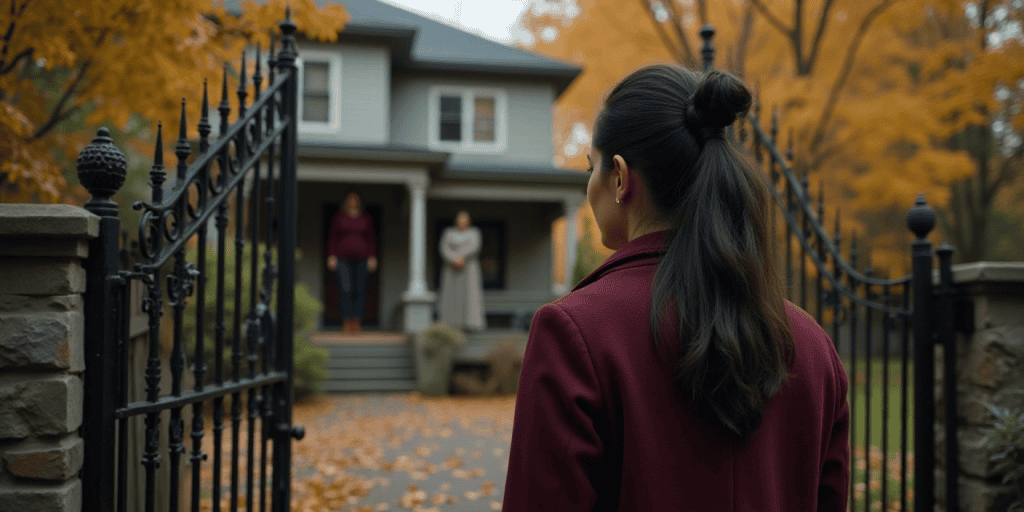I stayed longer than I should have because I still loved my narcissistic mother, even when I knew, deep down, her feelings for me weren’t the same.
I kept hoping that one day she’d see me, understand me, maybe even love me the way I needed.
That hope kept me tied to them far past the point of emotional safety.
It wasn’t just about walking away.
It was about grieving a mother I never really had, while still being haunted by the version I wished she could be.
Cutting ties didn’t happen overnight.
It came after years of trying to make things work, ignoring the betrayals, after silencing my own pain to keep the peace.
If you’re struggling with this, I want you to know you’re not alone.
So many of us carry this quiet heartache.
There’s nothing wrong with you for finding it hard.
It’s one of the most painful, complex decisions we’ll ever make.
Table of Contents
Why It’s So Hard For Me to Cut Ties With My Toxic Mother?

We’re taught that family is everything.
That no matter what happens, you should stick by them, forgive them, and keep showing up.
That belief was burned into me from childhood by my grandmother.
And for years, it kept me tangled in a toxic relationship with my mother.
Even when she belittled me, dismissed my achievements, or made me feel invisible, I stayed. I kept trying.
Because isn’t that what a “good daughter” does?
A part of me still craved the love I never got.
I wanted her to be proud of me.
I wanted her to say she was wrong, or that I mattered.
That hope lingered in every birthday call I made and every visit I forced myself to attend.
But guilt and fear are powerful.
Guilt made me wonder if I was being too harsh. Fear whispered that I’d regret it someday.
These emotions clouded my choices for years.
If you’ve felt this too, you’re not alone.
Wanting love from my narcissistic mother who hurts you doesn’t make you weak.
It makes you human. It’s normal to hesitate. It’s normal to question yourself.
The pain is real, and the process isn’t simple.
What You Might Feel After Cutting Ties With Toxic Parents?

After I finally cut ties with my narcissistic mother, I expected to feel free, and I did.
But what surprised me was everything else that came with it.
The guilt hit hard.
Even though I knew she’d never truly loved me, I still questioned myself.
Did I do the right thing? Was I being too unforgiving?
Then came the grief.
Not for the relationship we had, but for the one I had always wished for.
I grieved the mother I created in my mind.
The one who would someday change, who would finally see me, finally show up for me.
That fantasy had to die, too.
And doubt? It crept in during quiet moments.
Especially when other people said, “But she’s your mom,” like biology should erase all harm.
But I had to remind myself: I didn’t walk away out of anger.
I walked away to protect my peace.
Turns out, I’m far from alone.
Research shows that most people who go no-contact with a parent do so because of emotional abuse, and many still wrestle with guilt and grief long after.
If you’re in this space right now, please hear me: all your feelings are valid.
Relief doesn’t cancel out grief.
Guilt doesn’t mean you were wrong. Doubt doesn’t mean you made a mistake.
Healing is messy, and so is freedom.
Healing Takes Time For All Of Us

After the break, I expected to feel better right away.
I thought the silence would bring peace, and it did, eventually, but first came a kind of emptiness I didn’t know how to sit with.
I had to allow myself to mourn, not just the relationship, but the years I spent trying to earn love that was never going to come.
That mourning was necessary. It was the beginning of my healing.
I leaned on the few people I trusted.
My dad, close cousins, and my husband, who didn’t try to shame me back into that toxic dynamic.
Having a space where I could say everything out loud, without being judged or gaslit, helped me begin to see things clearly.
I wasn’t selfish. I wasn’t cruel. I was finally choosing myself.
Even now, when doubt creeps in, I remind myself why I made this choice.
I didn’t cut ties to punish anyone. I did it because peace matters. My mental health matters.
And sometimes, the only way to break the cycle is to walk away from the people who keep spinning it.
Healing takes time, but it does come.
Not all at once, but slowly, gently, one boundary at a time.
If You’re Struggling With Guilt, I Want You To Know This!

Guilt was the hardest emotion for me to untangle.
I kept thinking, Maybe I should have tried one more time.
Maybe if I had just said it differently, she would’ve heard me.
But no matter how many chances I gave my narcissist mother, nothing changed.
And it took me a long time to realize I was carrying a responsibility that was never mine.
You are not responsible for your parents’ happiness.
No matter how much your parents try to place that weight on your shoulders, that weight doesn’t belong to you.
You didn’t fail them by choosing peace. You honored yourself.
Love… real love… shouldn’t cost you your mental health, your dignity, or your sense of safety.
If staying in that relationship meant shrinking yourself, second-guessing your worth, or walking on eggshells, then walking away was necessary.
I know it’s not easy.
I know the guilt can feel overwhelming, especially when the world tells you to honor your parents no matter what.
That lingering guilt? It’s not just in your head.
Studies say emotional abuse can leave deep scars, making it hard to believe you deserve peace. But you do.
But I want you to know this: you deserve safety and joy too.
You deserve a life where love is safe, not conditional.
Healing isn’t selfish. It’s sacred.
And choosing yourself isn’t wrong. It’s brave.
It’s Very Okay If You Still Love Your Toxic Parents

This part confused me the most was how could I still love someone who caused me so much pain?
I used to think love had to mean loyalty, contact, and forgiveness on their terms.
But the truth is more complicated.
I realized I could still love my narcissistic mother, and leave her behind at the same time.
Both can be true.
I can love the parts of her that made me who I am.
I can remember moments that felt almost real, when I believed she cared.
That love doesn’t disappear overnight. It doesn’t make me weak, and it doesn’t mean I made the wrong choice.
You’re allowed to hold space for both the hurt and the love.
You don’t have to erase every feeling just to move on.
There’s power in saying, Yes, I loved her. Yes, she hurt me. And yes, I had to walk away.
Letting go doesn’t mean you stop caring.
It means you stop sacrificing yourself for someone who refuses to meet you with the love and respect you deserve.
If you still love your toxic parent, that’s okay, and it’s normal to have that feeling.
Your love doesn’t make the pain any less real, or your decision any less valid.
You need to Remember This!

For a long time, I wrestled with the fear that walking away meant I was abandoning my mother.
That narrative was planted in me early. Family sticks together, no matter what.
But I’ve learned something crucial: I didn’t abandon her. I chose myself.
There’s a difference.
I gave more chances than I should have.
I stayed longer than was healthy. I showed up even when it hurt.
And when I finally stopped, it wasn’t because I stopped caring.
It was because I couldn’t keep losing pieces of myself just to be accepted.
It’s also okay if they never understand your journey.
Some people are so wrapped up in their own narratives, they’ll never see the truth.
You might never get the apology, the acknowledgment, the validation.
That used to break me. Now, it frees me.
Because your healing doesn’t need their permission.
You are allowed to take your power back without justifying it.
You are allowed to protect your peace without explaining it.
Choosing yourself is not betrayal, it’s survival.
And the more you practice that truth, the less shame you carry.
You don’t owe anyone your suffering to prove your love. Not even your parents.
Quick Recap and Key Takeaways
- You’re not alone. Many people struggle to cut ties with toxic parents.
- It’s okay to love someone and still walk away.
- Guilt, grief, and doubt are part of the process.
- Healing takes time. There’s no perfect timeline.
- Your peace is a valid reason to let go.
- You’re not responsible for their happiness.
- You deserve boundaries, safety, and joy.
Breaking away from a toxic parent is never simple.
It’s layered with emotion, years of conditioning, and the deep ache of unfulfilled love.
But choosing yourself isn’t wrong. It’s brave.
You may still feel guilt or sadness, but those feelings don’t mean you made the wrong choice.
They just mean you’re human.
Keep reminding yourself why you made this decision.
Keep choosing peace, even when it feels unfamiliar.
You deserve a life that honors your heart, not one that constantly breaks it.
Here’s How I Can Help
If you’re somewhere between guilt and grief, stuck in the “maybe I should try one more time” phase, I get it.
I created The Next Chapter not as a quick fix, but as a space for people like us.
People who loved hard, stayed too long, and are finally choosing themselves, even when it still hurts.
It’s not therapy. It’s not fluff.
It’s a step-by-step roadmap to help you rebuild after walking away, emotionally, mentally, and practically.
Inside, you’ll find tools that helped me:
- Untangle guilt without shaming myself
- Set boundaries without second-guessing
- Start living a life where peace isn’t earned, it’s chosen
If you’re ready to heal on your terms, without needing their permission or understanding, The Next Chapter was made for you.
You’re not broken. You’re just finally ready for something better, and I’m here for all of it.
Related Posts:
- Cut Off Narcissistic Mother: How I Finally Cut Ties With Her After 30 Years of Hell
- What Cutting Off a Narcissist Really Feels Like? (My Day 1 to One Year Transformation)
- Why Narcissists Are Still Obsessed With You Even After You Cut Them Off?
- 10 Promises I’m Making to Myself After Cutting Off Narcissists
- 20 Ways You’ll Be Forever Miserable Until You Cut Off Narcissist In Your Life


